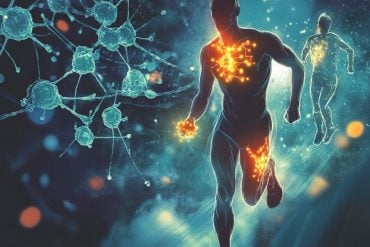Summary: People report their mental distress is reduced in the Summer compared to the Fall. Researchers speculate the seasonal improvement in mental wellbeing could be a result of improved diet, more frequent exercise, and improved sleep quality during the Summer months.
Source: Binghamton University
Mental distress tends to be lower in the summer when compared to the fall, according to new research from Binghamton University, State University of New York.
“Our results suggest that summertime is associated with better diet quality, higher exercise frequency and improved mood. This is important for the post-COVID era as we are getting into the summer season,” said Lina Begdache, assistant professor of health and wellness studies at Binghamton University.
Begdache had previously published research suggesting that mental distress and exercise frequency are associated with different dietary and lifestyle patterns. In a new study, Begdache and colleagues wanted to investigate the nature of the associations between diet quality, sleep quality, exercise, seasonal changes and mental distress among men and women based on age-groups—reflective of brain maturity—to potentially describe their intricate role in mental distress.
“Taken all together, our results confirmed the hypothesis that risk factors for mental distress are dynamic,” said Begdache.
“They also suggest that improving one factor may positively impact all others. For instance, if it is hard to improve diet or up exercise frequency, starting with adjusting the sleep cycle may ease the task. Likewise, upping exercise frequency may improve diet and sleep quality. This virtuous cycle will eventually lead to improving mental wellbeing, according to our results.
Additionally, our results support the notion of personalizing therapies based on gender and age-groups.”

The researchers collected daily data on diet, sleep, overall well-being, exercise and mental distress from individuals of different ages and followed them for four weeks in the summer and fall, for two years. The reason for the seasonal change was to account for alterations in circadian rhythm.
The researchers found the following:
- Good quality diet was associated with mental well-being.
- Good sleep quality was associated with mental and overall well-being, as well as with higher diet quality and exercise frequency.
- Seasonal changes had an impact on diet quality and mental health.
- Mental distress tended to be lower in the summer when compared to the fall.
- Seasonal changes were associated with alterations in diet quality and mental wellbeing.
“The association between diet, sleep, exercise, and seasonal changes in relation to mental distress is complex and multidimensional. These variables are intertwined in a way that a shift in one factor may alter directionality of others and, consequently, impact mood,” said Begdache.
“Therefore, it is crucial to recognize the dynamic relationships between these lifestyle factors and mental distress to provide the groundwork necessary for nutritionists and healthcare professionals to improve prophylactic and therapeutic approaches.”
About this psychology research news
Source: Binghamton University
Contact: Press Office – Binghamton University
Image: The image is in the public domain
Original Research: Open access.
“Dynamic associations between daily alternate healthy eating index, exercise, sleep, seasonal change and mental distress among young and mature men and women” by Lina Begdache et al. Journal of Affective Disorders Reports
Abstract
Dynamic associations between daily alternate healthy eating index, exercise, sleep, seasonal change and mental distress among young and mature men and women
Diet
Diet quality, exercise and sleep are dynamic modifiable factors that impact mental health. However, taking into consideration gender and age-groups as risk factors may be necessary to customize therapies. The purpose of the study was to assess the dynamic interactions between diet quality, and lifestyle factors in relation to mental distress in these sub-groups.
Method
A total of 52 adult participants provided 4 week-daily records using the Food-Mood questionnaire. Data were collected for 2 years during the summer and fall seasons. Spearman’s correlation as well as multivariate and multilevel regression analyses were used to identify correlations and model the relationships, respectively, between the variables of interest.
Results
There was a mild negative correlation between AHEI and K-6 scores;rs= -0.08 (95% confidence interval = [-0.14, -0.02]). Men and participants aged 30 years or older had lower K-6 scores than women (0.8 vs 1.8, p < 0.001), and younger adults (0.6 vs 1.9, p < 0.001), respectively. Lower K-6 scores associated with 20 min or more exercise compared to days without exercise or exercised less than 20 min (1.2 versus 1.9, p < 0.001). Seasonal changes were associated with alterations in diet quality and mental wellbeing (P < 0.001).
Limitations
A convenience sample was used.
Conclusion
Our results suggest that adjusting one modifiable factor may lead to improvement in others. In addition, these factors are age and gender dependent. Therefore, customization of dietary and lifestyle factors based on gender and age-groups is recommended to optimize mental wellbeing.







